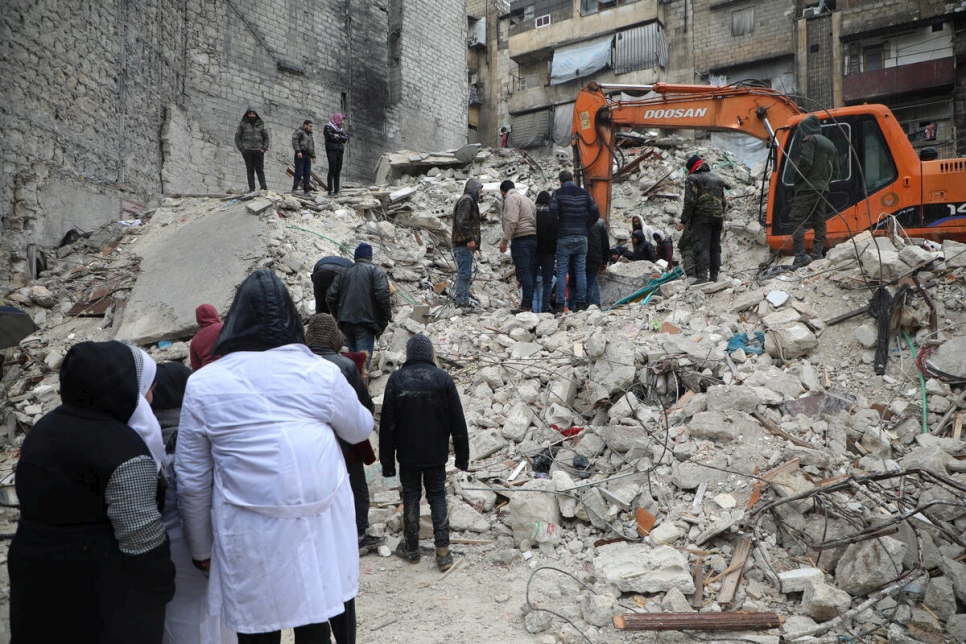This is a summary of what was said by Philippe Leclerc, UNHCR Representative in Türkiye, and Matthew Saltmarsh, UNHCR Spokesperson - to whom quoted text may be attributed - at today's press briefing at the Palais des Nations in Geneva.
 People search for survivors under the rubble of a building in Aleppo's Al-Kallasah neighborhood following the earthquakes that struck Syria and Türkiye on 6 February. © UNHCR/Hameed Maarouf
People search for survivors under the rubble of a building in Aleppo's Al-Kallasah neighborhood following the earthquakes that struck Syria and Türkiye on 6 February. © UNHCR/Hameed Maarouf
UNHCR Representative in Türkiye Philippe Leclerc:
The situation is tragic, and we are witnessing it every day on the ground in the 10 provinces which are affected by the earthquakes.
As an optimistic note, in addition to the figures provided by Jens (OCHA), I would like to mention the 8,000 people that were rescued by the search and rescue teams that are operating under the leadership of AFAD, the Turkish emergency disaster relief agency, which is intervening in 10 provinces and has extensive support being provided, and will be reinforced by the OCHA team as well as many countries who are coming in to provide assistance.
We are witnessing again the disastrous effect of it on the lives of families, be they Turkish [or others], of course - because these 10 regions are also hosting the largest refugee population in the world. More than 1.7 million of the 15 million people inhabiting these 10 provinces are Syrian refugees, and in some of these provinces - Kilis for example - one out of every two people is a refugee. Gaziantep, Şanlıurfa, Hatay, one out of four or five are also refugees.
So we have made our capacity of UNHCR and other UN agencies available to the Turkish government, led by AFAD. IOM, WFP, UNDP, UNICEF, UNFPA and so many other agencies are working around the clock to support the leading efforts of AFAD.
Again, as we speak, the search and rescue efforts are the most important efforts that need to be carried on, so that more than 8,000 people can be rescued all over the 10 provinces.
Right now, UNHCR is providing, with other UN agencies, what the Turkish authorities are requesting - so basically kitchen sets, mattresses, tents - so that we can complement the leading efforts of the Turkish authorities to rescue Turkish citizens and refugees in the same manner.
And what we appreciate as always with the Turkish authorities is that no difference is made between any person, it's a humanitarian effort, a humanitarian inclusive policy that has been led by Türkiye for more than 12 years, and Syrian, Turkish - whoever is a victim - is similarly treated.
The situation of refugees, as I said, is that they are affected as the Turkish population is. What I highlighted is the way the Turkish authorities and the Turkish state has been including refugees in their policies. So, only 2 per cent of the total population are refugees - Syrians - which are more than 3.5 million as we speak in the whole of the country and 1.7 million in the 10 provinces which have been affected by the earthquake.
So they are living side by side with Turkish citizens in the same buildings which have collapsed. They are participating in the rescue as volunteers under the coordination of AFAD. So it's not that there's a difference between refugees and Turkish citizens. They are living and affected in the same way.
There are only 47,000 refugees who are in temporary accommodation centers throughout the seven camps in these provinces. And actually, these camps may be used as a place where earthquake victims will be transferred to as there's a high need of supporting displaced people because of the buildings being affected.
So we do not see at this stage any difference in response and even of needs between the refugees and the Turkish people. And this is why we are supporting the Turkish authorities to respond to both, as we speak, in the various provinces I describe.
UNHCR Spokesperson Matthew Saltmarsh:
From the regional perspective, obviously this is an absolute hammer blow for Syria's displaced populations. The refugees and those who have been displaced within Syria itself are already suffering from an economic crisis. We're in the depths of winter. We've been seeing snowstorms. And of course, you know, the crisis has been going on for over a decade within Syria itself.
As you probably know, there are almost 7 million people internally displaced. There's a huge need for humanitarian support and assistance in the northwest and northern parts of Syria. In the northwest, there are 4.1 million people who require that assistance, the majority of whom, of course, are women and children. In the northwest, we are working through NGO partners who are working tirelessly to reach those in desperate need of help.
So, in terms of UNHCR response in the country, we've been mobilizing our staff and our stockpiles from our country office and our field offices to get much-needed support to the field, to the areas that have been hammered by this earthquake, primarily initially, that's in the areas we've heard about around Aleppo, Hama, Latakia, and Idlib. And that's initially going out with what we call non-food items and core relief items. These are blankets, winter clothes, shelters, tents, cooking items and so on. So that's the immediate response, but obviously that will develop as the days go on.






